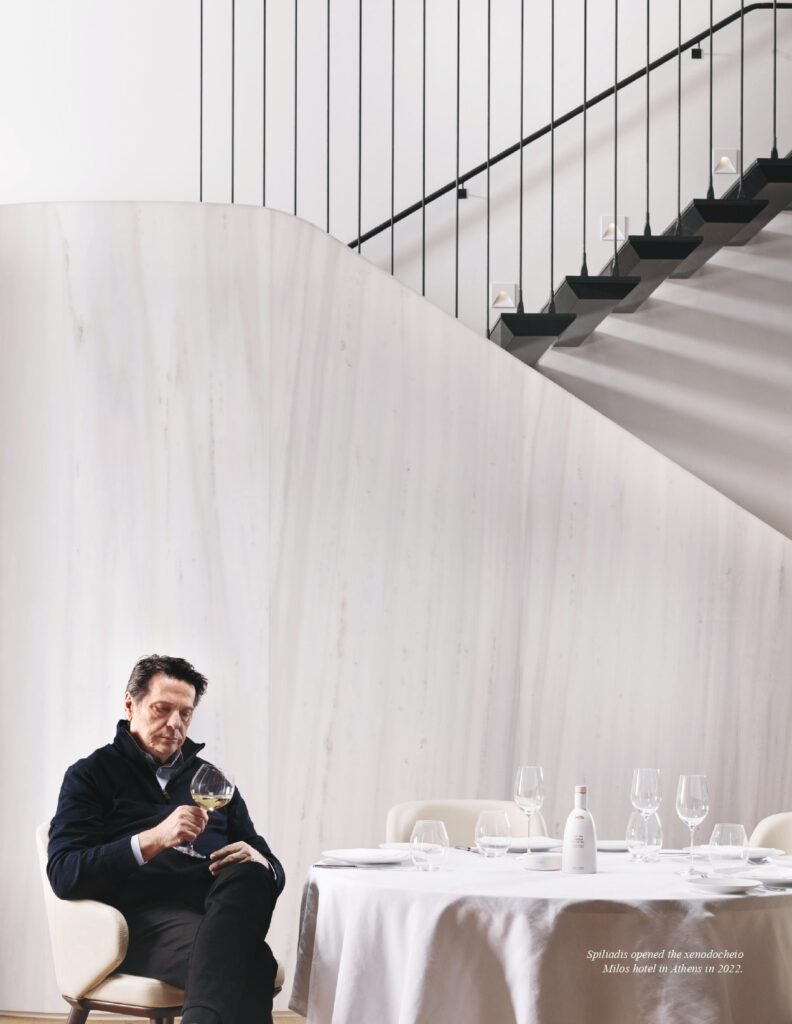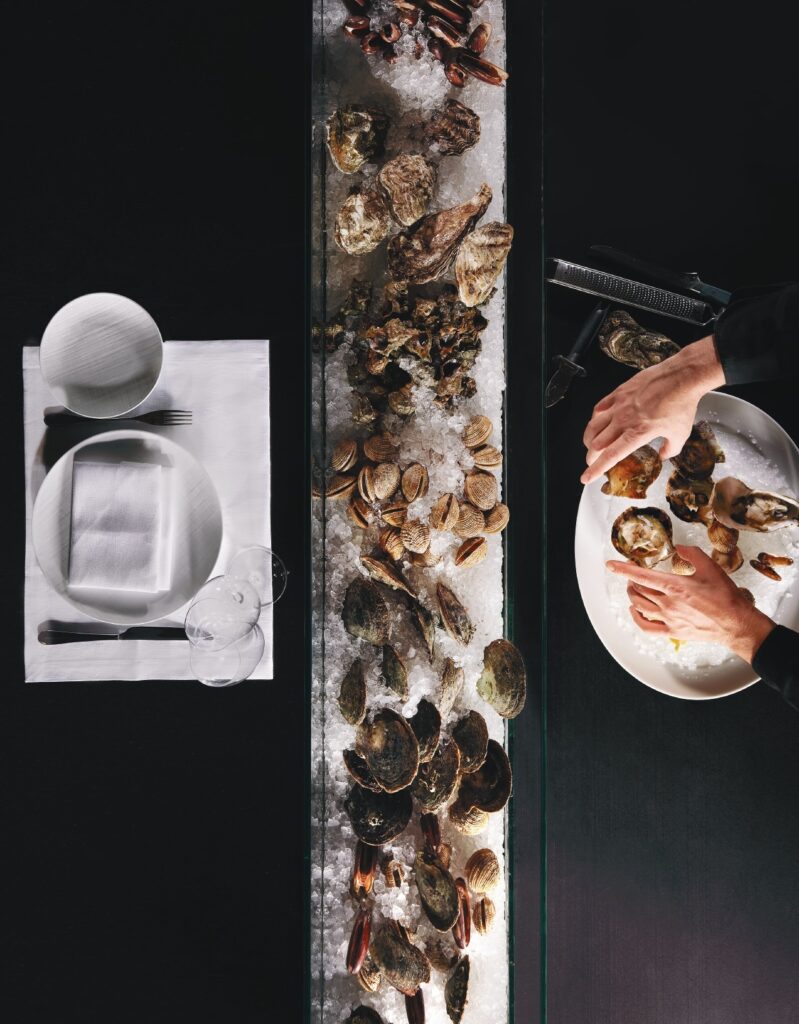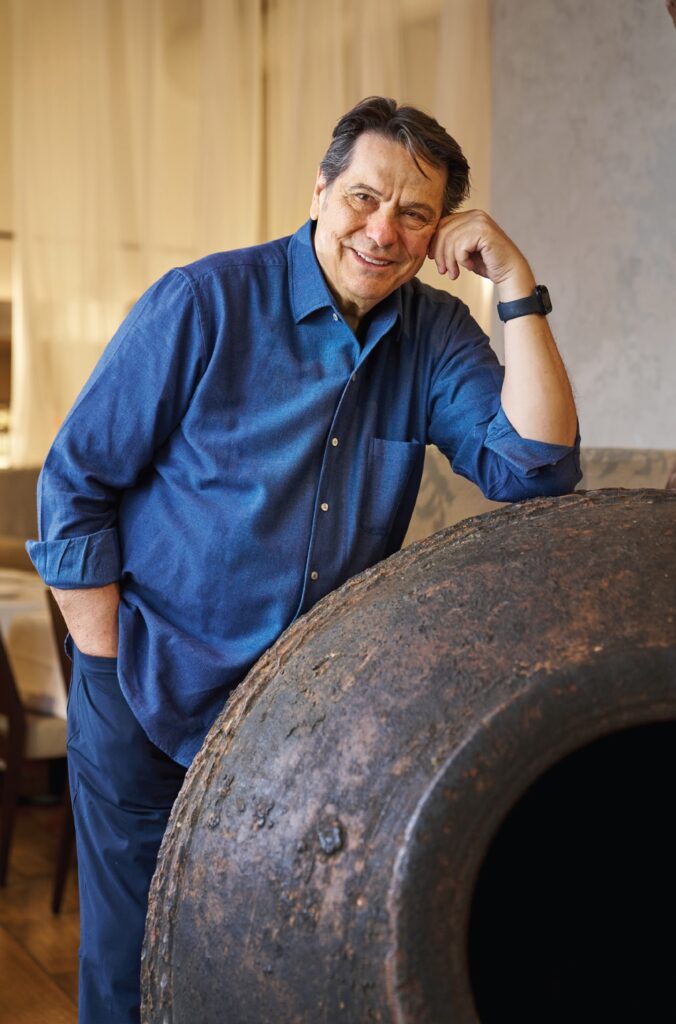How Costas Spiliadis Conquered the World
Posted by estiator at 12 May, at 17 : 44 PM Print
COVER STORY

After half a century, Milos keeps raising the bar for Greek gastronomy. By Michael Kaminer
On a frigid December night in 1979, Costas Spiliadis opened a modest restaurant on a bustling block of Park Avenue, the heart of Montreal’s Greek community. He called it Milos―“a name that sounded round, light, easy to pronounce, and evoked Greece,” he said at the time. One of his first customers, the jeweler next door who was from Pyrgos, told Spiliadis, “You do not know how to cook fish,” according to The New York Times. A sympathetic Egyptian-Jewish customer from Alexandria tried Spiliadis’s lamb chops and suggested improvements of his own. Fast-forward to 2024: From those humble beginnings, Milos has conquered the world, with eight locations including New York, London, Las Vegas, Miami, Dubai, and Los Cabos. Coming full circle, Milos arrived in Athens in 2021 with xenodocheio Milos, an elegant, light-filled hotel near Syntagma Square. And three more restaurants are set to open this year, including splashy locations in Toronto, Palm Beach, and Singapore.
By his own admission, Spiliadis makes an unlikely restaurateur. “I come from a completely different background,” he tells Estiator in an interview in Milos’s second-floor, glassed-in private dining room in midtown Manhattan. “I had nothing to do with food or restaurants, except through my family.” Spiliadis was born in Patras; his father hailed from Filia, in the Peloponnese. “My mother was Greek, born and raised in Istanbul. She brought with her a very strong tradition of food and gastronomy, which she practiced in a very simple way at home. So, we ate very well, with beautiful, clean, balanced food. It was a variety based on a lot of vegetables, fish, and legumes. We had meat maybe once a week.”
More importantly, he tells Estiator, “there was a certain ceremony around food. The whole family would gather for both lunch and dinner around the table. We had our positions, with my father and mother sitting on opposite sides, and the kids in between.” Over meals, the family discussed “values. We discussed our lives. That’s where ideas of importance were communicated and transmitted from parents to children. Food was more than just eating and filling your stomach. It was an experience that included socialization. It was an overall experience. It was a lifestyle.”

Spiliadis left Greece for the U.S. in the 1960s. After stints at universities in New York and Maryland, he headed to Montreal in 1971. “I knew Montreal had a very strong Greek community, very anti-junta, and that was all I knew,” he told The New York Times in 2019. He loved the city and continued his sociology studies at Concordia University downtown. He was a cofounder of Radio Centre-Ville, an influential community radio station with a Greek programming lineup he oversaw. But what he encountered in the city’s restaurants would change his life’s direction.
“I could not see anything that was similar to the real Greek experience, or even similar to the experience I had as a child at home,” he tells Estiator. “Greek restaurants were all greasy spoons. The food was terribly made. I saw people making moussaka and adding potatoes―nothing like the authentic moussaka I used to eat. And, of course, there was a lot of gyros and a lot of souvlaki. I thought, ‘This is not all that Greek cuisine should offer to ourselves and to our Canadian and American friends.’”
The more Spiliadis saw, the more he took it personally. “What I saw was misrepresenting our culture,” he says. “Greece is so full of great food, great food experiences, and a great lifestyle, and this was completely missing. So I made that my mission.”
That mission became a crusade to “change the bad image of Greek food and the Greek experience. And to introduce what I knew as Greek gastronomy and the real lifestyle.” By his own admission, Spiliadis was “an idealist. I had an innocence and an ignorance of what I couldn’t do, and that worked in my favor. I don’t know if I could take chances like that now.”
“I had nothing to do with food or restaurants, except through my family.”
His adopted hometown turned out to be fertile ground for Spiliadis’s experiment. “It was a lucky moment that all of this happened in Montreal,” he says. “There were two things. You had a very strong, beautiful Greek community. The other, which Montreal continues to have, is a very strong, genuine, and authentic gastronomic character. So the Greek community gave me the moral weapons to fight my fight. And the French gastronomic tradition of Montreal gave me the measure, the standards, of what it means to be a good restaurateur. The city was both a great teacher and a great school.”
Was he worried about alienating customers whose conception of Greek food was everything he stood against? “Sure,” Spiliadis says. “But I was not there to please a market. I was not there to deliver something that the market would expect. I was laying out a vision.”
He didn’t have to worry. Customers appreciated Spiliadis’s pioneering approach to the Greek food experience. Many of them have remained loyal for decades, even following the brand around the world as it opened new outposts.
Before meeting with Estiator late afternoon one Friday in April, Spiliadis shared a table near Milos’s entrance with a distinguished-looking gentleman. “That was David Dangoor, who was president of Philip Morris in Canada in the 1970s,” Spiliadis says. “He visited Milos right after we opened in 1979. He’s a customer and a longtime friend. We were reminiscing about Milos before it expanded when I had a small restaurant with blue-and-white tablecloths.”

Since those early days, Milos has become so successful that restaurateurs continue to copy it, Spiliadis says. “Copying is a compliment, you know. But I hope Milos can become an inspiration, not a place to copy because I’d love to see people bringing their own creativity and authenticity. That’s how we’ll bring things to the next level. Otherwise, we’re just going to be static.”
Milos’s menu continues to feature favorites like a simple tomato and feta salad, a stack of thin-sliced zucchini and eggplant, a made-to-order lobster salad, beautiful whole fish, filet mignon, and a Black Angus rib-eye.
Along with his approach to food, Spiliadis also pioneered an unstuffy approach to top-end cuisine that resonates even more today. “I introduced this casual-but-elegant approach,” he says. “You see people paying top dollar and enjoying the food. But we do it in a less formal way. That represents a way of living.” As we speak, we spot a man in a fleece hoodie at a corner table, enjoying lunch. Some diners are nattily dressed in business attire; others wear jeans and fashion sneakers.
At age 77, the hyperfocused Spiliadis has no intention of slowing down. In New York last year, he opened Milos Wine Bar, a “more affordable, small-plate” spot with a menu inspired by the London Bar, a legendary gathering spot across from Crete’s Chania Market, “one of the most beautiful public markets in the world.” Milos Wine Bar’s menu features more than 100 Greek wines, more than any New York establishment.
The Milos empire now includes two Milos at Sea luxury yachts, which guests charter for “a unique gastronomical journey” through the Greek islands. The Milos hotel in central Athens “gives guests the opportunity to experience Greece as I understand it,” he says. “We also encourage our guests to experience Athens from a culinary point of view, not just to visit the Parthenon. We facilitate visits to the public markets so they can see how people really eat in Athens.”

A line of Milos-branded products will hit store shelves in the next 16 to 18 months, Spiliadis says, including olive oil and sea salts. All of the products and branding have been developed in-house by Milos’s own team. Spiliadis’s son, George, oversees Milos’s wine program; daughter Evridiki manages social media and marketing for Milos.
Spiliadis’s daily routine is the same wherever in the world he finds himself. “I wake up―not get up―and call our three basic suppliers, one in Greece, one in Portugal, and one in New York, to get a view of what’s coming in and what’s happening,” he says. “Then I go back to sleep for a couple of hours, get dressed, and go to the physical space in that city.”
With all of Milos’s growth, how does Spiliadis maintain his exacting standards across a portfolio that’s grown so broad? “To remain authentic, and this is a key word, that’s a challenge,” he says. “I don’t have an army of managers and executives. It’s a very small team. And our staff internalizes our standards. I’m personally engaging with staff and customers, and sharing the values of Milos. When a dishwasher makes sure every fork and knife looks perfect, it’s not because someone told them to. It’s because it’s part of the values. It’s what they believe they should do.”
“We facilitate visits to the public markets so they can see how people really eat in Athens.”
Spiliadis has “no regrets―at least from a professional point of view,” he tells Estiator. “Personally, there were sacrifices for this kind of commitment. But you can’t cut corners with that. You must totally commit to that, and you can only commit to that if you love what you do. So It’s a very harmonious situation for me.”
And his advice for budding restaurateurs? “In a word, persistence,” he says. “It will not happen overnight. I mean, it took me 45 years. There were disappointments and there were times that were difficult. But I never gave up. I never compromised. Persistence is the key to success.”


















